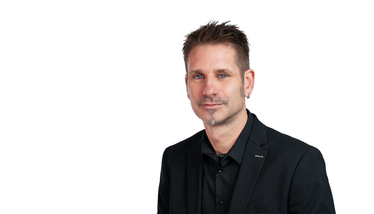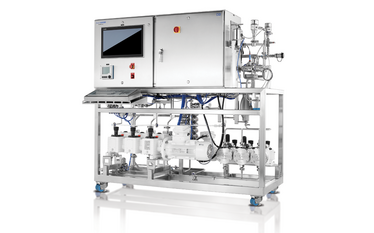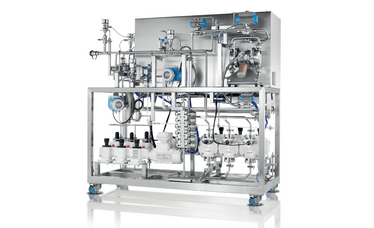
Oligonucleotides: Getting Equipment Selection Right
The oligonucleotides market is growing rapidly, with drug developers increasingly attracted to this intriguing drug modality. But manufacturing can be challenging – and choosing the right equipment for the job is essential. Established suppliers – such as Asahi Kasei Bioprocess (AKB) – can not only provide valuable guidance on equipment selection based on your process but also help guide further optimization when producing these complex therapeutics.
| 7 min read
sponsored by Asahi Kasei Bioprocess

Featuring Tom Krebstakies, Sales Manager for Europe and Asia at Asahi Kasei Bioprocess Deutschland GmbH in Cologne, Germany
Why are oligonucleotides such a hot topic in drug development?
Oligonucleotide therapeutics are characterized by high efficiency and high specificity. They can directly target the site of action, such as the regulation of gene expression, and have great potential for treating metabolic diseases, genetic diseases, and cancer, as well as preventing infectious diseases.
The science, produc tion, and commercialization of oligonucleotides have all advanced quickly in recent years – and the global market has developed tremendously. The global oligonucleotide synthesis market was valued at around $7 billion in 2023 and is projected to potentially double or triple by 2030. The calculated CAGR is therefore easily >12 percent during the forecast period. Though delivery into the target cell has historically been a challenge, platforms have now emerged, such as LNPs or GalNAc conjugates for siRNAs for liver delivery. Now, the focus is also on developing delivery solutions for very specific tissues and cell types, opening avenues to tackle a broader range of diseases.
As anything grows, scaling up manufacturing processes and capacities becomes a major topic. Priorities include modernizing facilities, optimizing machinery, and implementing more efficient synthetic processes. At the same time, there is also a need to consider sustainability. Oligonucleotide manufacturing processes are connected to a certain amount of waste; for example, 1 kg of product requires 1000 kg of acetonitrile. Finding ways to reduce waste is obviously better for the environment and the planet, but can also connect to improved production efficiency and cost control. The industry is working on optimizing existing technologies and developing new approaches to reduce waste and byproducts. Digitalization, automation, and Pharma 4.0™ will be important for both scalability and environmental care. A better understanding of processes will also help guide optimization and create the ideal synthesis.
What is the manufacturing process for oligos?
The most widely used state-of-the-art process is solid phase oligo synthesis. The synthesizer controls the reoccurring four-step cycle of detritylation, coupling, capping, and oxidation. The reaction occurs in synthesis columns, while the synthesizer precisely delivers the amidites and all required reagents. The sizing and pairing of the synthesizer with the columns are key for effective coupling and yield.
Every cycle, a phosphonamidite is added to the growing and immobilized oligonucleotide chain. Once finalized, the oligo is then cleaved from its solid support and protecting groups are removed to obtain an active API. This step is recommended to be automated using a cleavage and deprotection system, ensuring optimized conditions for high efficiency.
The downstream phase starts with purification (reversed-phase, anion exchange, or hydrophobic interaction chromatography) to remove undesired shortmers and impurities. Also in this step, the use of dedicated medium pressure liquid chromatography systems with matching dynamic axial compression columns is imperative for efficiency and high-quality yields. Auxiliary components and features are available to increase handling, safety, and process efficiency. After purification and before lyophilization of the end-product, the oligos undergo the process of desalting by buffer exchange and concentration. For this application, AKB recently launched an ultrafiltration/diafiltration (UF/DF) system intended for use in oligonucleotide manufacturing environments that require specific safety directives.

What are the biggest considerations and challenges when setting up a new manufacturing line?
From our perspective as a technology supplier, we recommend considering scalability, as well as the integration into the facility and the overall production approach. Is the production line intended for one product? Or is the line for a CDMO producing multiple products where the highest flexibility is required?
Because of the complexity of scale- up, partnerships and collaboration with organizations that have the right expertise and technological solutions can be beneficial to make the process faster and easier. The number of variables that need to be considered in both upstream and downstream processes require more than a “plug-and-play” approach with large- scale equipment.
How should companies approach the challenge of choosing the right equipment?
After determining the right oligonucleotide synthesis type and considering the desired functionality, target application, and cost, carefully evaluate the characteristics of each required step and then select the equipment that best suits your goals. High quality equipment and components play a crucial role in ensuring the efficiency and reproducibility of oligonucleotide synthesis at scale.
All the steps in the manufacturing process require in depth analysis of the parameters, which should be aligned with your process requirements; however, there are a few general features that I can highlight. I recommend looking for an innovative and thoughtful mechanical design that is complemented by automation. Automation speeds up the process steps while ensuring consistency across multiple batches – a prerequisite for reproducible results. Also, choose a system that will allow for seamless transition from small scale to large scale. AKB’s systems and columns are specifically designed with scalability in mind, offering a range of sizes that cater to varying synthesis volumes and throughput demands.
Finally, keep in mind that, though a truly high-performance production line usually requires a higher initial investment, this cost is repaid in long-term impact on operational efficiency and overall cost-effectiveness. Opting for high-quality equipment should result in lower maintenance requirements and less downtime – ultimately leading to higher productivity and cost savings by ensuring synthesis processes run smoothly and efficiently with maximum uptime.

How is Asahi Kasei Bioprocess (AKB) innovating oligonucleotide manufacture?
AKB offers state-of-the-art equipment and components from synthesis through concentration, including the THESYS™ Oligosynthesizer, THESYS ACS Column, THESYS SCS Column, THESYS Cleavage & Deprotection System, CURSIV™ MPLC System, CURSIV DAC Ergo LC Column, SLURIPREP™ System and VANTIJ™ Ultrafiltration/Diafiltration TFF System. All our products are “built for you” to ensure that a customer’s individual requirements are met. The ability to use the same equipment to manufacture different products with different chemicals or at different scales eliminates the need for costly new investment or reconfiguration of equipment.
AKB relies on user familiarity with the cross-platform components of all systems. Devices and components are designed to work together seamlessly in a single integrated system, minimizing compatibility issues and ensuring optimal performance and efficiency. This also applies to the OCELOT® system control for all automated system types, which is an intuitive, powerful software platform that can be integrated into plantwide control systems. That said, the operator is certainly not disregarded; rather, the operator is always considered in the ergonomic design of a system, to enable increased efficiency and safety.
With 30 years of experience in various areas of biopharma manufacturing, AKB can apply technical principles precisely to the requirements of different drug modalities – or rethink them to develop innovative products. Our strength is the ability to apply our expertise and experience individually in every project to achieve the best possible results – together with the customer. Close collaboration strengthens relationships and communication channels. As a trusted advisor, we encourage interaction with project managers, engineers, and service during and after successful project completion.
What advice can you offer to manufacturers that are just getting started with new lines and investments in the oligo field?
Make sure you have a clear understanding of the oligonucleotide synthesis process before purchasing equipment or components. And choose a supplier that has a comprehensive range of equipment – and don’t forget to consider their customer support. A good supplier should have exceptional customer support that ensures smooth procurement and ongoing help with any issues that arise, including advice on improving efficiency and maintaining compliance with industry standards.
To ensure long-term cost efficiency, evaluating the cost of initial equipment and operations is a given, but you’ll see greater benefits if you are willing to collaborate with partners that can help you take performance and efficiency to another level – and in a future-proof way.
AKB’s experience in oligo scale-up and the comprehensive portfolio of flexible, future-ready technologies – combined with a breadth of technical expertise and end-to-end support – make the company an ideal partner to quickly navigate the complex challenges in this exciting and rapidly growing therapeutic space.



















